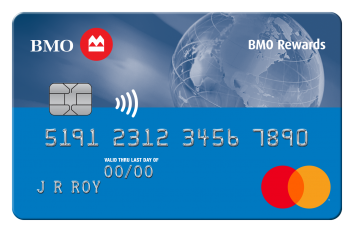 Credit Cards
Credit Cards10 credit cards with mobile device insurance in Canada
A decade ago, you probably wouldn’t have heard about insuring your cell phone. But as the cost – and necessi...

Find the right credit card.
Get StartedFocus On
Scared to open your credit card statements? Forgot which card's maxed out and which one's paid off? It's time to apply for a balance transfer credit card. Balance transfer credit cards let you consolidate your debt while helping you save on interest charges. And at LowestRates.ca, finding the best balance transfer credit card has never been easier.
Below is a table comparing the key features of some of our favourite balance transfer cards this year.
Card |  |  |
|---|---|---|
Rewards | N/A | 1 BMO Rewards point for every $1 spent. |
Balance transfer rate | 0% (12.99% after the first 10 months) | 1.99% (for the first 9 months plus 1% fee) |
Standard Interest Rate | 12.99% | 19.99% |
Annual Fee | $0 | $0 |
| Get this card | Get this card |
50+ trusted partners (and growing) on our site to compare mortgage rates, insurance and credit cards
$1 billion+ saved in interest and fees
14+ million Canadians helped per year
Looking for more credit card info? Check out our Help Centre.
With a balance transfer credit card, you can transfer debts from your existing credit cards to a single low-interest card. After all, some balance transfer credit cards have introductory interest rates as low as 0%.
And getting started is easy: use funds from your balance transfer card's credit line to pay off the high interest rate balances on your other credit cards.
Credit card balance transfers can be a great way to reduce debt quickly. You can dedicate a larger portion of your monthly payments to principal rather than interest charges.
Canadians who find themselves mired in high interest credit card debt. With a balance transfer card, you can pay off your existing credit card debt with funds from your new card. Just transfer your balances and focus on paying off your card during the introductory period.
Of course, balance transfer credit cards only work if you're committed to paying down your debt. That's why these cards are best for those who know how to use a credit card responsibly, make their payments on time, and are ready to get their finances back in order.
Balance transfer credit cards tend to only be available to those with reasonably good credit scores — usually 680 or higher.
Applicants often have significant debt (which they'll likely transfer to their balance transfer credit card), but they need to have a decent credit history and the means to pay off their card in a timely fashion.
To qualify for most balance transfer credit cards, you usually need a minimum household income ranging anywhere from $30,000 to $70,000 per year.
Step 1: Fill out the balance transfer portion of your application. You can designate what credit cards you want to pay and the amount of the balances you wish to transfer.
Step 2: Once you have your balance transfer credit card, you can write a cheque from the card or call the credit card company to make a transfer. You just need the account numbers from your old credit cards and the balance amounts you want to transfer.
Step 3: Any time you complete a transfer, check with your previous credit card provider to make sure your balance has been paid in full and to verify that you won't continue to incur interest charges.
Simple — use your balance transfer credit card to pay off your debts before the introductory period expires. Here's a simple way to create a payment plan: take the amount of debt you're transferring and divide that figure by the number of months the introductory period lasts.
For example, if you're transferring $6,000 of debt and your introductory period lasts 8 months at 0% interest, divide $6,000 by 8. In this scenario, you need to make monthly payments of $750 (plus any extra fees) to pay off the balance transfer card before your interest rate resets.
If you miss even one payment on a balance transfer credit card, your interest rate will reset to a much higher rate, effectively negating the main appeal of the card. In fact, you could end up with more debt than you started with.
Most balance transfer cards also levy extra fees and surcharges on transfers. For example, if you want to transfer $2,000 to a card with a 2% surcharge, you would have to pay an additional $40 on the transaction.
Make sure these charges aren't excessive. In general, cards with fees above 2% or 3% of the total transfer amount are uncompetitive and should be avoided.
Yes. Some balance transfer cards let you deposit funds from the card's credit line into an investment vehicle of your choice. So instead of paying off other credit cards, you can transfer funds into a savings account or another vehicle. The gap, or 'spread,' between the introductory interest rate on the balance transfer and the return you earn on your savings account or investment is yours to keep.
But while this may sound good, the gap between the introductory rate and what you could earn in a savings account isn't usually enough to justify the hassle, and deploying a transfer into riskier investments, like stocks, can easily backfire if those securities fall in price. Plus, if you miss a payment, your interest rate will reset, turning those easy profits into painful and unnecessary losses.
So why get a balance transfer credit card? It can help you save money on interest charges and gives you the time you need to get your finances in order. Remember to shop around for the right card and make sure you pay off your transfers as quickly as you can.
Compare all the best balance transfer credit cards today at LowestRates.ca.
LowestRates.ca may receive compensation when you click on links to those products or services; however, our content and calculations are objective and free from bias. The opinions expressed are purely those of LowestRates.ca; thus, partners are not responsible for any editorials or reviews that may appear. For current term and conditions on any advertiser or partner’s product, please visit their website.
 Credit Cards
Credit CardsA decade ago, you probably wouldn’t have heard about insuring your cell phone. But as the cost – and necessi...
 Credit Cards
Credit CardsOn the face of it, a credit limit increase sounds like a no-brainer. And if your bank offers one up without the hassle o...